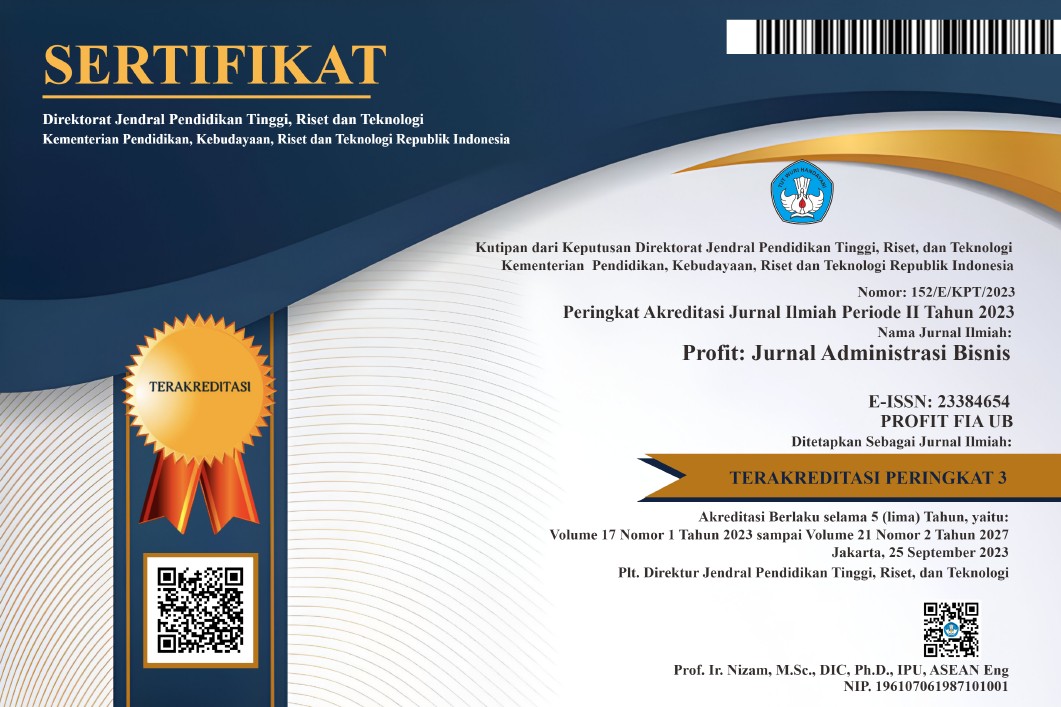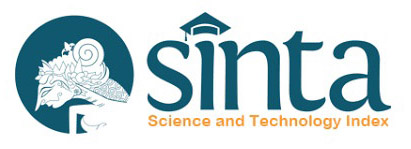ENTREPRENEURIAL COMPETENCIES DEVELOPMENT MODEL ON SMALL MEDIUM TOURISM ENTERPRISES (SMTEs)
DOI:
https://doi.org/10.21776/ub.profit.2020.014.02.4Keywords:
entrepreneurial competence, tourism, SMTEs, Bromo Tengger SemeruAbstract
The focus of this research is directed at identifying entrepreneurial competence of SMEs in the tourism sector, identifying competency development problems and formulating competency development models of SMTE players in supporting the realization of a sustainable tourism industry. The study was conducted in the National Tourism Strategic Area (KSPN) Bromo Tengger Semeru, East Java, Indonesia. The research method uses a qualitative approach with descriptive analysis techniques, data collection is done by in-depth interviews with the Regional Apparatus Organization and tourism sector SMEs. The results of this study indicate that: the level of entrepreneurial competence, namely knowledge, skills and entrepreneurial attitudes of the tourism sector SMEs is still relatively low; One of the factors that influence the low competency is the less optimal role of the government in increasing entrepreneurial competence, the pattern of coordination between regional organizations has not gone well and all stakeholders have not been involved in developing. Therefore, the proposed model for developing SMTE's entrepreneurial competencies is a collaborative governance approach on an ongoing basis.
References
Bramwell, B., & Lane, B. (2011). Critical research on the governance of tourism and sustainability. Journal of Sustainable Tourism, 19(4/5), 411–421.
Buhalis, D. & Carios Costa. (2011). Tourism Management Dynamics: Trends, Management and Tools, New York, Routledge
Carayanis, G. Ellias, et. al., The quintuple helix innovation model: Global warming as a challenge and Driver for Innovation, Journal of Innovation and Entrepreneurship, ISSN 2192-5372.
Cooper, Chris Cs., (2017). Tourism: Principles and Practice, Sixth Edition, Longman, England
Gregoric, Marina & Andreja Kovac Pajic. (2016). The Impact of Small Medium Entrepreneurship on Tourism Development n The Republict of Croatia. Journal of Business Paradigms. 1 (1).
Lawal, fatai Afani, Oluwole O.I, Omotayo, A.A, Olaleke O.O & Akeem A.T. (2018). Modelling The Relationship Between Entrepreneurial Climate adn Venture Performance: The Moderating Role of Entrepreneurial Competence. Academy of Entrepreneurship Journal. 24 (1)
Liu, et. al., (2018). Livelihood Benefits from Post-Earthquake Nature-Based Tourism Development: A Survey of Local Residents in Rural China.
Lorio, M.; Corsale, A. Rural tourism and livelihood strategies in Romania. J. Rural Stud. 2010, 26, 152–162.
Miles, M. B., Huberman, A. M., & Saldana, J. (2013). Qualitative data analysis. SageMehta, J.N.; Kellert, S.R. Local attitudes toward community-based conservation policy and programmes in Nepal: A case study in the Makalu-Barun conservation area. Environ. Conserv. 1998 , 25, 320–333.
Mxunyelwa, Siyabonga & Dinesh Vallabh (2017). Skill as Impedement to Small and Medium Tourism Enterprise (SMTEs), Eastern Cape, South Africa. African Journal of Hospitality, Tourism and Leasure, 6 (4).
Torania, Fransisco G.B & Raul A.S. Valencia. (2014). Knwoledge Management, Entrepreneurial Competencies adn Organizational Development in Micro and Small Enterprices In Rural Regions In the State of Yucatan, Mexico. Europian Scientific Journal. 10 (1).
World Economic Forum. (2019). The travel and tourism competitiveness report.
World Trevel & Tourism Council. (2019). Travel and Tourism Globalc Economic Impact and Trend 2019.
Downloads
Published
Issue
Section
License
The copyright of the received article shall be assigned to the journal as the publisher of the journal. The intended copyright includes the right to publish the article in various forms (including reprints). The journal maintains the publishing rights to the published articles.

This work is licensed under a
Creative Commons Attribution-NonCommercial 4.0 International License

















